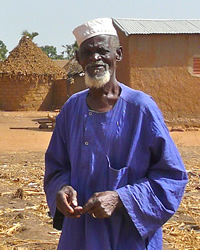Senoufo, Niangolo in Burkina Faso

Photo Source:
Rita Willaert - Flickr
Creative Commons
|
Send Joshua Project a map of this people group.
|
| People Name: | Senoufo, Niangolo |
| Country: | Burkina Faso |
| 10/40 Window: | Yes |
| Population: | 116,000 |
| World Population: | 116,000 |
| Primary Language: | Senoufo, Senara |
| Primary Religion: | Ethnic Religions |
| Christian Adherents: | 8.00 % |
| Evangelicals: | 1.55 % |
| Scripture: | Translation Needed |
| Ministry Resources: | No |
| Jesus Film: | No |
| Audio Recordings: | No |
| People Cluster: | Gur |
| Affinity Bloc: | Sub-Saharan Peoples |
| Progress Level: |
|
Introduction / History
The various Senoufo groups live in the Middle Volta region of West Africa which includes parts of Cote d'Ivoire, Mali and Burkina Faso. They are divided into three groups: Northern, Central, and Southern, according to the three distinct language divisions. As a whole, the Senoufo tribes speak over thirty dialects. One of these dialects is Senara, spoken by the Niangolo Senoufo people in Burkina Faso.
What Are Their Lives Like?
Most of the Niangolo Senoufo are subsistence farmers. They have been admired as skilled agriculturists, cultivating dry rice, yams, peanuts and millet in the grasslands that are prevalent in their region. One of the most important ways for a male to gain prestige is to become a sambali, which is a "champion cultivator." A sambali is respected throughout his lifetime and upholds the honor of his residential settlement before the entire village and surrounding district.
One important aspect of Senoufo society is its concept of "community." The Senoufo think of themselves as one group, with all of their ideas pointing in the same direction. The concept of the "individual" is known only in limited circumstances; thus, no man stands alone. Instead, each person is thought of as part of an extended family, a member of the village, the elder or younger brother, etc. Everyone eats as a group and dips into a common dish. The fields are worked collectively, food is stored collectively, and each family contributes to the village. A Senoufo is always aware of his place in society as it relates to others in the group. To the Senoufo, the good of the community always comes before the good of the individual. Unless the entire tribe makes a change, such as converting to a different religion, no one does.
Another important feature of Senoufo life is the poro or "male secret society". The poro prepares men for leadership in the community so that they might attain wisdom, accept responsibility, and gain power. It begins with the child's grade of "discovery," followed by extensive training and service. It ends with the ritual death of the child and the final graduation of the "finished man." Dramatic ceremonies, dances, and visual displays mark the passage from one grade to the next. When the man reaches about 30 years of age, the initiation is complete and he is considered an adult. He then becomes one of the elders with whom the chief consults on major decisions. Poro sanctuaries are hidden inside dense groves of trees outside the Senoufo villages. These sacred groves are used as schools, meeting houses, and places of worship.
Since World War II, the Senoufo region has become more commercialized and urbanized. Today, young men have opportunities to move to the cities and earn money. This has weakened the influences that Senoufo fathers formerly had over their sons. The importance of the communal nature of their society has also declined. Unfortunately, the weakening of these two areas has allowed Islam to begin seeping into the cracks of this rapidly changing society.
What Are Their Beliefs?
About one-fourth of the Senoufo are Muslim, although that figure is steadily increasing. The remainder continue to practice their traditional ethnic religions. The belief in various gods, ancestral spirits, and bush spirits, along with participation in witchcraft, magic, and cults, are all a part of daily life for most Senoufo.
What Are Their Needs?
Today, Niangolo Senoufo society is rapidly changing. The Senoufo need an opportunity to hear the truth of the gospel before a total conversion to Islam takes place. Intense prayers and increased evangelism efforts must be made to reach them with the good news.
Prayer Points
Pray for the Lord to give the Niangolo Senoufo a record-setting crop as a testimony of his goodness and power.
Ask the Lord to call disciples to win, equip and send Niangolo Senoufo people to the lost in West Africa.
Ask the Lord to give the Senoufo believers the courage to disciple others.
Ask the Lord to raise up strong local fellowships of believers among each of the Senoufo tribes.